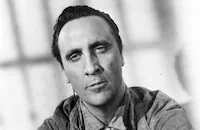Fast-Walking

Brief Synopsis
Cast & Crew
George Robotham
Timothy Carey
Robert Hooks
Deborah White
Kay Lenz
Susan Syrrell
Film Details
Technical Specs
Synopsis
"Fast-Walking" Miniver is a dope-smoking guard in an Oregon prison who helps the local madam get customers for her brothel. Miniver is always looking for something that will allow him to quit his stressful job, and he thinks it may have come in the form of William Galliot. Galliot is an African-American political activist who has been imprisoned and offers Miniver fifty-thousand dollars to help him escape. However, the plan becomes complicated when Miniver learns that his cousin wants his help in killing Galliot.
Videos
Movie Clip


Film Details
Technical Specs
Articles
Fast-Walking
Woods's involvement in James B. Harris's midwestern prison film, Fast-Walking (1982) (also released under the title, The Joint) is often overshadowed by his more prominent roles. Yet, it is a significant precursor to the politically questionable dynamics in which the actor is often entrenched because he not only starred in the film but was also its producer. In it, Woods plays Frank "Fast-Walking" Miniver, a corrupt, but rascally prison guard who regularly smokes marijuana during his shift and runs prostitutes to Mexican laborers out of his cousin Evie's (Susan Tyrrell) convenience store. Frank's other cousin, foul-mouthed and racist Wasco (Tim McIntire), is incarcerated in the same prison and he sells drugs and women to the other inmates with the help of his spunky and seductive girlfriend, Moke (Kay Lenz). When black political prisoner William Galliot (Robert Hooks) arrives at the prison, Wasco plots to have him killed. But Galliot offers Frank $50,000 to have him escape.
Tonally, the film is less that of an action film and more that of a cheeky dramedy, lending itself to exploitation film conventions like explicit sex, sensational violence, car races, rebellion and drug use. These elements paired with a rather screwball soundtrack seems to make light of the racial tension in the prison (targeted murders of black and white inmates) and the precarious position of Galliot. The writer and director, Harris, is best known for his production work for Stanley Kubrick's films, and Fast-Walking might be thought of in terms of influence, particularly dark humor and cinematography. Yet, Harris's film not does not share Kubrick's penetrating mood.
Described by The New York Times as a "prison melodrama of such consistent, proud witlessness that it deserves mention though not attendance," Fast-Walking nevertheless provides an archetypal frame for the particular roles Woods takes on and also for other films about racial justice that rely on a seemingly indifferent white-male anti-hero, like Marc Forster's Monster's Ball (2001) and Clint Eastwood's Gran Torino (2008). Moreover, Fast-Walking might be thought of in terms of contemporary prison reform conversations, as the topic as garnered bipartisan attention in recent years. That actor Robert Hooks is an activist for racial equality in real life, one who pioneered roles for African Americans in theater and in the movies, adds another important layer to the film. Fast-Walking was filmed in Montana, shortly after the eruption of Mt. St. Helens which delayed production. It was distributed by Lorimar Productions, Inc., a subsidiary of Warner Bros.
By Rebecca Kumar

Fast-Walking
Quotes
Trivia
Miscellaneous Notes
Released in United States 1982
Released in United States on Video August 2, 1990
Shot in 1980 by Lorimar Productions.
Released in United States 1982
Released in United States on Video August 2, 1990


















